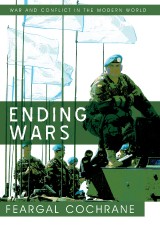Details

Ending Wars
War and Conflict in the Modern World 1. Aufl.
|
18,99 € |
|
| Verlag: | Wiley |
| Format: | EPUB |
| Veröffentl.: | 23.08.2013 |
| ISBN/EAN: | 9780745645179 |
| Sprache: | englisch |
| Anzahl Seiten: | 240 |
DRM-geschütztes eBook, Sie benötigen z.B. Adobe Digital Editions und eine Adobe ID zum Lesen.
Beschreibungen
Many books have been written about war, but few have focused on how wars can be brought to an end. Wars are rarely inevitable however and this book is aimed at understanding how violent conflicts can be brought to a close through intervention, mediation and political negotiation. <p>The simple premise underlying the book is that wars between states and wars within states are generally fought by rational people for particular political goals or perceived interests. War is better understood as a methodology rather than an ideology. When the context, issues and actors in these armed conflicts change then it is often possible to control, or even transform such violence.</p> <p>By bringing together a number of existing debates from peace and conflict research as well as scholars of international relations, the book examines the dynamic forces that lie behind the ending of wars and how these have changed over time. Examples are drawn from a wide range of armed conflicts to analyse the efforts that have been made to move from War-War to Jaw-Jaw, or more typically Jaw-War. Efforts at third-party intervention, mediation and political negotiation across a range of conflict zones from Europe to Sub-Saharan Africa are discussed in full. Neither idealistic nor fatalistic, this book is a must-read for all students of international politics and security studies.</p>
Introduction. <p>.</p> <p>Chapter 1: The Changing Nature of War.</p> <p>.</p> <p>Chapter 2: Third Party Intervention.</p> <p>.</p> <p>Chapter 3: Negotiation or Victory?.</p> <p>.</p> <p>Chapter 4: Resistance to the Peace.</p> <p>.</p> <p>Chapter 5: Ending the War on Terror.</p> <p>.</p> <p>Chapter 6: Reconciliation and Rebuilding.</p> <p>Conclusion</p>
"Offers a fine background reading, both for students interested in conflict resolution and for practitioners" <br /> <i><b>Journal of Peace Research</b></i> <p>"Readers who are looking for an overview of existing knowledge on war termination will find this book to be a valuable resource."<br /> <b><i>Political Science Quarterly</i></b></p> <p>"This superb book combines strong research with clear thinking, to address a vexed question: how are wars – of various types – brought to an end? Drawing upon a wide range of country examples and deploying valuable insights, Feargal Cochrane – one of the leading authorities on conflict resolution - provides a sophisticated and lucid explanation of the most successful methods of stopping violence. Ending Wars deserves to be read by all scholars of global conflict and peace."<br /> <b>Jon Tonge, <i>University of Liverpool and Chair of the Political Studies Association of the UK</i></b></p> <p>"<i>Ending Wars</i> is a thoughtful and carefully argued book. Cochrane starts with the basic premise that violent conflict is a rational act by those who believe it will achieve a desired end. By emphasizing the politics of armed conflict and recognizing that violence is a tactic, he persuasively demonstrates that war is not inevitable. Through political dialogue and negotiations it is possible to create alternatives for the parties to meet their goals and interests through non-violent means. This excellent introduction will be read with great interest by those seeking to better understand war and the potential for peace."<br /> <b>Terence Lyons, <i>George Mason University</i></b></p>
<b>Feargal Cochrane </b>is Director of the Richardson Institute for Peace and Conflict Research in the Department of Politics and International Relations at Lancaster University.
Many books have been written about war, but few have focused on how wars can be brought to an end. Wars are rarely inevitable however and this book is aimed at understanding how violent conflicts can be brought to a close through intervention, mediation and political negotiation. <p>The simple premise underlying the book is that wars between states and wars within states are generally fought by rational people for particular political goals or perceived interests. War is better understood as a methodology rather than an ideology. When the context, issues and actors in these armed conflicts change then it is often possible to control, or even transform such violence.</p> <p>By bringing together a number of existing debates from peace and conflict research as well as scholars of international relations, the book examines the dynamic forces that lie behind the ending of wars and how these have changed over time. Examples are drawn from a wide range of armed conflicts to analyse the efforts that have been made to move from War-War to Jaw-Jaw, or more typically Jaw-War. Efforts at third-party intervention, mediation and political negotiation across a range of conflict zones from Europe to Sub-Saharan Africa are discussed in full. Neither idealistic nor fatalistic, this book is a must-read for all students of international politics and security studies.</p>


















